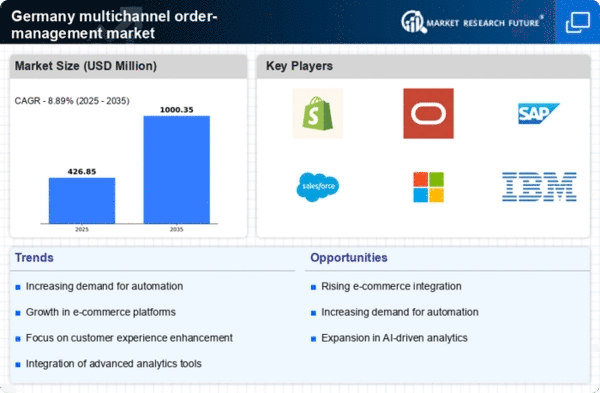Rising E-commerce Adoption
The increasing adoption of e-commerce in Germany is a pivotal driver for the multichannel order-management market. As consumers increasingly prefer online shopping, businesses are compelled to enhance their order management systems to accommodate this shift. In 2025, e-commerce sales in Germany are projected to reach approximately €100 billion, reflecting a growth rate of around 10% annually. This surge necessitates robust multichannel order-management solutions that can seamlessly integrate various sales channels, ensuring efficient order processing and fulfillment. Companies that invest in advanced order management systems are likely to gain a competitive edge, as they can respond more effectively to consumer demands and preferences. The multichannel order-management market is thus positioned to expand significantly, driven by the need for businesses to adapt to the evolving retail landscape.
Demand for Operational Efficiency
Operational efficiency remains a critical driver for the multichannel order-management market in Germany. Businesses are increasingly seeking ways to streamline their operations, reduce costs, and improve service delivery. The implementation of sophisticated order management systems can lead to enhanced inventory management, reduced order processing times, and improved customer satisfaction. In 2025, it is estimated that companies that adopt efficient order management practices could see a reduction in operational costs by up to 15%. This focus on efficiency not only helps businesses remain competitive but also allows them to allocate resources more effectively. As a result, the multichannel order-management market is likely to witness substantial growth, as organizations prioritize systems that facilitate operational excellence.
Shift Towards Omnichannel Retailing
The shift towards omnichannel retailing is significantly influencing the multichannel order-management market in Germany. Retailers are increasingly recognizing the importance of providing a seamless shopping experience across various channels, including online, mobile, and physical stores. This trend is driven by consumer expectations for flexibility and convenience. In 2025, it is anticipated that over 60% of retailers in Germany will adopt omnichannel strategies, necessitating advanced order management solutions that can integrate and synchronize inventory across all platforms. The ability to manage orders efficiently across multiple channels is crucial for meeting customer demands and enhancing brand loyalty. Consequently, the multichannel order-management market is expected to expand as businesses invest in technologies that support omnichannel retailing.
Consumer Preference for Personalization
Consumer preference for personalization is emerging as a significant driver for the multichannel order-management market in Germany. Shoppers are increasingly seeking tailored experiences, which necessitates that businesses implement systems capable of managing personalized orders effectively. In 2025, it is estimated that 70% of consumers in Germany will expect personalized shopping experiences, prompting retailers to invest in advanced order management solutions that can accommodate these preferences. This trend not only enhances customer satisfaction but also fosters brand loyalty, as personalized experiences are often linked to higher customer retention rates. As a result, the multichannel order-management market is likely to experience growth as businesses strive to meet the evolving expectations of their customers.
Technological Advancements in Logistics
Technological advancements in logistics are playing a vital role in shaping the multichannel order-management market in Germany. Innovations such as automation, artificial intelligence, and real-time tracking are enhancing the efficiency of supply chain operations. These technologies enable businesses to optimize their order fulfillment processes, reduce delivery times, and improve overall customer satisfaction. In 2025, it is projected that logistics technology investments in Germany will exceed €5 billion, reflecting a growing recognition of the importance of efficient logistics in the retail sector. As companies increasingly adopt these technologies, the demand for sophisticated order management systems that can integrate with logistics solutions is likely to rise, further propelling the growth of the multichannel order-management market.
















